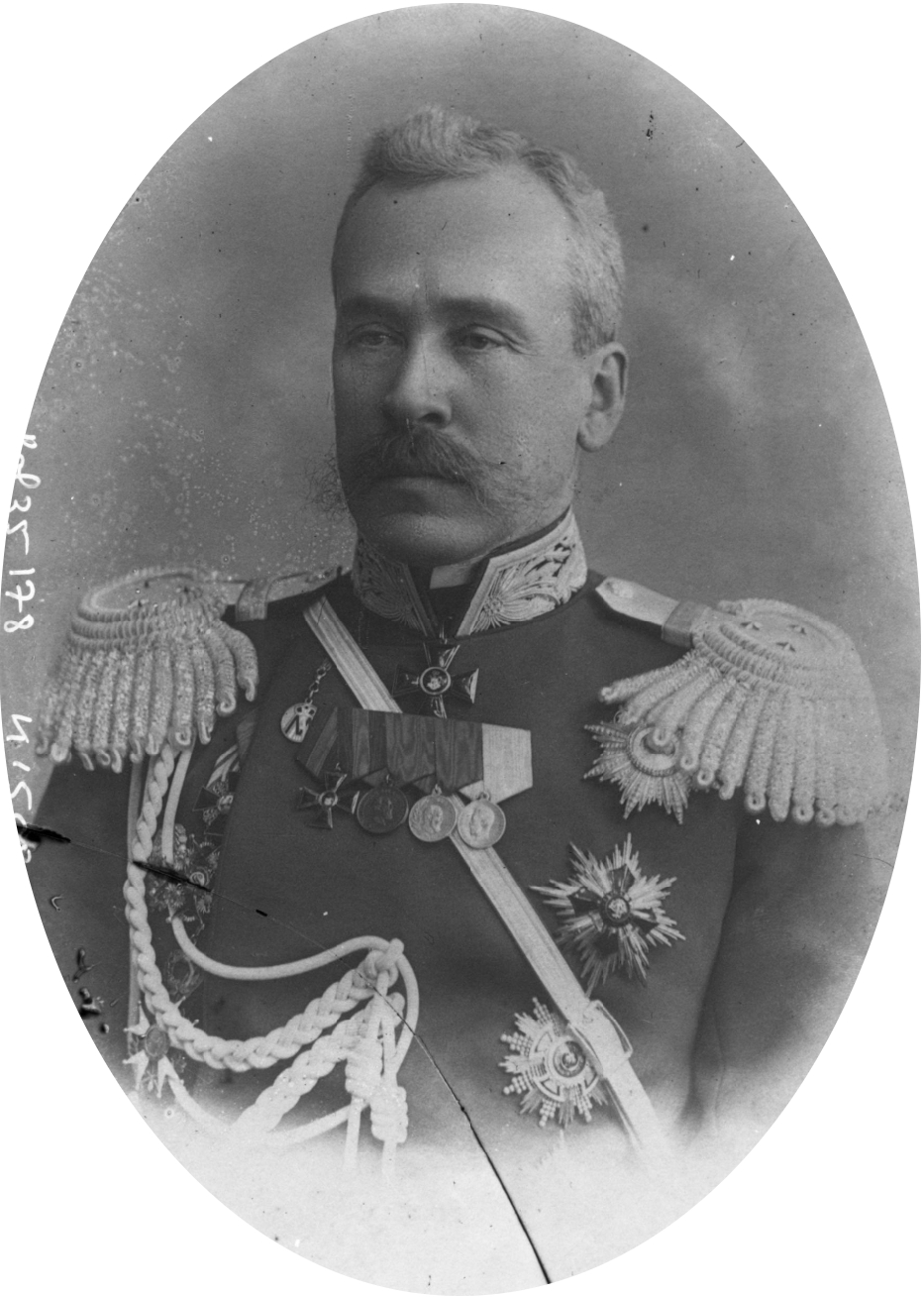Yakov Zhilinsky
Yakov Zhilinski | |
|---|---|
 | |
| Born | March 15, 1853 Mikhaylov, Ryazan Oblast, Russia |
| Died | 1918 Russia |
| Allegiance | |
| Service/ | Russian Imperial Army |
| Years of service | 1876-1917 |
| Rank | General |
| Commands | 14th cavalry division 10th army corps General Staff Warsaw military district Northwestern front |
| Battles/wars | Russo-Japanese war World War I |
Yakov Zhilinski (Russian: Яков Григорьевич Жилинский March 15, 1853–1918) was Chief of Staff of the Imperial Russian Army prior to World War I and thereafter as a field commander until he was relieved of command in 1914.
Biography
Zhilinsky was born into a family of minor nobility from Mikhaylov, Ryazan Oblast. He graduated from the Nicholas Cavalry School in St. Petersburg in 1876, and was assigned to the Horse Guards Regiment of the Imperial Guard as a cornet. In 1883, he graduated from General Staff Academy, and after serving as a senior aide to the staff of the 1st Grenadier Division, he served from February 14, 1894 on the Military Scientific Committee of the General Staff, a military intelligence organization responsible for the study of foreign countries.
During the Spanish-American War Zhilinsky was Russian military observer at the general headquarters of the United States forces in Cuba. On his return, he published a book on the war, which analyzed the causes of the defeat of the Spanish Army. In 1899, Zhilinsky served as a member of Russian delegation at the Hague Peace Conference. He was appointed commander of the 52nd Dragoons Regiment from August 1899. In 1900, he was promoted to the rank of major general.
In the Russo-Japanese War (1904–1905), Zhilinsky was Chief of Staff to the Viceroy of the Far East, Admiral Yevgeni Alexeyev, until Alexeyev was dismissed in October 1904. He remained in the combat zone to serve the Minister of War, Aleksey Kuropatkin until the end of the conflict. From January 27, 1906 he was commander of the 14th cavalry Division, and from July 7, 1907 of the 10th Army Corps. Promoted to Cavalry general on April 18, 1910, he served as Chief of the Russian General Staff from February 22, 1911 to March 4, 1914.
At the beginning of World War I, Zhilinsky was appointed commander of the Warsaw Military District, Governors-General of Warsaw, and commander of the Northwestern Front. The Northwestern Front included the 1st Army and 2nd Army. After the unsuccessful East Prussian Campaign he was relieved of command and sent as a military representative to France from 1915-1916. He was recalled to Russia in the autumn of 1916. On September 19, 1917, he was ordered to retire. After the October Revolution, he attempted to flee Russia, but was captured and executed by the Bolsheviks in 1918.
Honors
Order of St. Stanislaus 3rd degree, 1880.
Order of St. Anne 3rd degree, 1888
Order of St. Stanislaus 2nd degree, 1894.
Order of St. Anne 2nd degree, 1896
 Order of St Vladimir, 4th degree, 1899
Order of St Vladimir, 4th degree, 1899 Order of St Vladimir, 3rd degree, 1902
Order of St Vladimir, 3rd degree, 1902Order of St. Stanislaus 1st degree with swords, 1904.
Order of St. Anne 1st degree with swords, 1905
 Order of St Vladimir, 2nd degree, 1906
Order of St Vladimir, 2nd degree, 1906 Order of the White Eagle, 1912
Order of the White Eagle, 1912 , Order of St. Alexander Nevsky, 1913
, Order of St. Alexander Nevsky, 1913
References
 Chisholm, Hugh, ed. (1922). Encyclopædia Britannica (12th ed.). London & New York: The Encyclopædia Britannica Company.
Chisholm, Hugh, ed. (1922). Encyclopædia Britannica (12th ed.). London & New York: The Encyclopædia Britannica Company. {{cite encyclopedia}}: Missing or empty|title=(help)- Biography at firstworldwar.com
- 1853 births
- 1918 deaths
- Imperial Russian Army generals
- Military historians
- Governors-General of Warsaw
- Russian military personnel of the Russo-Japanese War
- Russian military personnel of World War I
- Victims of Red Terror in Soviet Russia
- Recipients of the Order of St. Anna
- Recipients of the Order of St. Vladimir
- Recipients of the Order of the White Eagle (Russian)
- Recipients of the Order of Saint Stanislaus (Russian)
